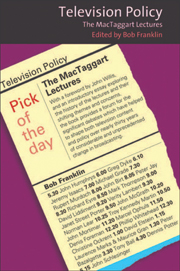Book contents
- Frontmatter
- Contents
- Acknowledgements
- Foreword
- Introduction
- The James MacTaggart Lectures
- TV Drama: The Case against Naturalism
- Naturalism and Television
- Taboos in Television
- Signposting Television in the 1980s: The Fourth Television Channel
- Television Drama, Censorship and the Truth
- The Day after Tomorrow: The Future of Electronic Publishing
- The Primacy of Programmes in the Future of Broadcasting
- Reflections on Working in Film and Television
- ‘Opening up the Fourth Front’: Micro Drama and the Rejection of Naturalism
- Power and Pluralism in Broadcasting
- Ethics, Broadcasting and Change: The French Experience
- Freedom in Broadcasting
- Deregulation and Quality Television
- The Future of Television: Market Forces and Social Values
- The Future of the BBC
- Occupying Powers
- A Culture of Dependency: Power, Politics and Broadcasters
- Talent versus Television
- A Glorious Future: Quality Broadcasting in the Digital Age
- Rewarding Creative Talent: The Struggle of the Independents
- Television versus the People
- Public-Interest Broadcasting: A New Approach
- A Time for Change
- The Soul of British Television
- Television's Creative Deficit
- Freedom of Choice: Public-Service Broadcasting and the BBC
- First Do No Harm
- Appendix A Edinburgh International Television Festival, 29 August–2 September 1977: Programme
- Appendix B Précis of Ted Turner, James MacTaggart Lecture 1982; Dr Jonathan Miller, James MacTaggart Lecture 1983
- Index
Deregulation and Quality Television
from The James MacTaggart Lectures
Published online by Cambridge University Press: 05 August 2013
- Frontmatter
- Contents
- Acknowledgements
- Foreword
- Introduction
- The James MacTaggart Lectures
- TV Drama: The Case against Naturalism
- Naturalism and Television
- Taboos in Television
- Signposting Television in the 1980s: The Fourth Television Channel
- Television Drama, Censorship and the Truth
- The Day after Tomorrow: The Future of Electronic Publishing
- The Primacy of Programmes in the Future of Broadcasting
- Reflections on Working in Film and Television
- ‘Opening up the Fourth Front’: Micro Drama and the Rejection of Naturalism
- Power and Pluralism in Broadcasting
- Ethics, Broadcasting and Change: The French Experience
- Freedom in Broadcasting
- Deregulation and Quality Television
- The Future of Television: Market Forces and Social Values
- The Future of the BBC
- Occupying Powers
- A Culture of Dependency: Power, Politics and Broadcasters
- Talent versus Television
- A Glorious Future: Quality Broadcasting in the Digital Age
- Rewarding Creative Talent: The Struggle of the Independents
- Television versus the People
- Public-Interest Broadcasting: A New Approach
- A Time for Change
- The Soul of British Television
- Television's Creative Deficit
- Freedom of Choice: Public-Service Broadcasting and the BBC
- First Do No Harm
- Appendix A Edinburgh International Television Festival, 29 August–2 September 1977: Programme
- Appendix B Précis of Ted Turner, James MacTaggart Lecture 1982; Dr Jonathan Miller, James MacTaggart Lecture 1983
- Index
Summary
Verity Lambert addresses the question ‘What can we do to preserve quality?’ in the context of a broadcasting system experiencing deregulation, reflecting both government policy and the emergence of multichannel broadcasting. Lambert begins with definitions but acknowledges that the notion of ‘quality’ is contested. She suggests that money is central since it allows high production values, well-researched programmes, a good programme mix and funds innovation, risks and the occasional mistake. Lambert claims ‘you may not know it [quality] when you see it, [but] you certainly know it when you don't’.
The inclusion of a ‘quality threshold’ in the Broadcasting Act 1990 is a significant amendment, but, additionally, the ITC must hold ITV companies to their programming commitments, especially the production and airing of documentaries and current affairs in prime time and the BBC and Channel 4 must ‘not lose their nerve’ when confronted by falling ratings.
Lambert concludes by considering the role of programme-makers (inhouse and independents) in sustaining quality: her focus is on independent production. Establishing an association for independents would help eliminate the fragmentation and competition between them which can reduce programme quality. Independents also require ownership of the rights in their programmes, an independent mechanism for evaluating a fair price for programmes and guaranteed access to the network. If deregulation and a freer market are to co-exist with quality programming it will require programme-makers to refuse ‘to compromise or lower standards’ but also to ‘seize the opportunities that are there’.
- Type
- Chapter
- Information
- Television PolicyThe MacTaggart Lectures, pp. 139 - 146Publisher: Edinburgh University PressPrint publication year: 2005

